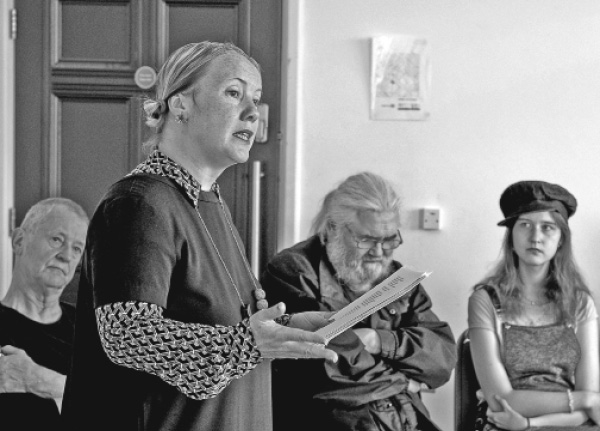
A TRANSMISSION FROM THE LAND OF LUXURIA
first performed on August 1, 2017
The Florence Institute, Liverpool, UK
performed three times in 2017
CARRON LITTLE AKA THE QUEEN OF LUXURIA
Chicago, IL
626172801c626172801a626172801r626172801r626172801o626172801n626172801l626172801i626172801t626172801t626172801l626172801e626172801@626172801g626172801m626172801a626172801i626172801l626172801.626172801c626172801o626172801m
carronlittle.com
A TRANSMISSION FROM THE LAND OF LUXURIA
CARRON LITTLE AKA THE QUEEN OF LUXURIA
Over the last three years I have been invited to different neighborhoods and cities to create public engagement projects, starting with “Neighborhood Magic” in 2015. Through research in each place I develop interactive public performances and public art. In 2017, I was invited to create a two-phase project for the city of Liverpool where I proposed to interview eight women between the ages of 20 to 100, selecting one woman from each decade. I wrote poetry inspired by each conversation, which became a starting point for public performance. As part of the residency supported by We Make Places, I had a solo performance at The Florence Institute aptly named “The Florrie” by locals. The audience was invited to share their important life moments and I selected vocal works from the body of my people poetry that related to the experiences shared by the audience.
As a performance artist I’ve had a long fascination for spoken dialect and the structure of speech. Being of Scottish descent, our language was banned in the sixteenth century, and I’m fascinated by how this has shaped and formed spoken dialect, and how the roots of the Gaelic language has maintained a musical resonance in the structure of speech. This interest in oral performance traditions influences the structure of my writing and performance. My study of language has taken me to Ancient Greek lyric and choral traditions, as it’s fascinating to explore how language is not just impacted by geography and culture, but how it is gendered. I’m interested in creating spaces where open discourse is given liberty, is given permission, is given time, and is listened to.
In integrating poetic speech into lyric and choral compositions, I pose the question of whether this has the capacity to re-establish truth and meaning back into our local communities. As an artist, I act as a conduit in these situations, facilitating discourse and public conversations inspired by the mediums of poetry and public performance. I’m interested in how poetry expands critical discourse, and, by creating an expanded poetic landscape, traces the city—transforming into active social spaces of communication. The role language and the voice plays in our society is vital in building an inclusive and peaceful one.